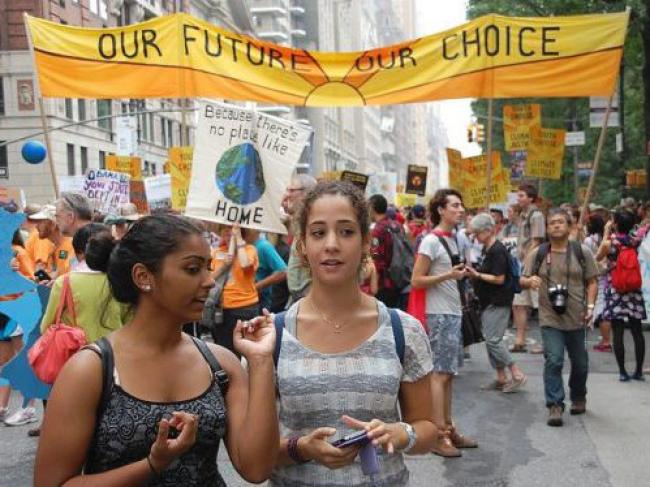Articles Menu

Children can be effective messengers to shift their parents’ level of concern about climate change because they aren’t seen as holding any entrenched political ideology, according to a paper published Monday in the journal Nature Climate Change.
“The collective action that is required to mitigate and adapt to climate change is extremely difficult to achieve, largely due to socio-ideological biases that perpetuate polarization over climate change,” the team of authors led by North Carolina State University grad student Danielle F. Lawson writes in an abstract.
But “because climate change perceptions in children seem less susceptible to the influence of world view or political context, it may be possible for them to inspire adults towards higher levels of climate concern, and in turn, collective action,” they add. Which means that “child-to-parent intergenerational learning—that is, the transfer of knowledge, attitudes, or behaviours from children to parents—may be a promising pathway to overcoming socio-ideological barriers to climate concern.”
The research team set out to test their “proposed pass-through effect” by looking at how 10- to 14-year-olds’ exposure to course work on climate change affected their parents’ attitudes as well as their own. It turned out that “teaching a child about the warming climate often raised concerns among parents about the issue,” Scientific American reports. “Fathers and conservative parents showed the biggest change in attitudes, and daughters were more effective than sons in shifting their parents’ views.”
“This model of intergenerational learning provides a dual benefit,” Lawson said. “[It prepares] kids for the future since they’re going to deal with the brunt of climate change’s impact. And it empowers them to help make a difference on the issue now, by providing them a structure to have conversations with older generations to bring us together to work on climate change.”
The study used a curriculum that consisted of four classroom activities and a field-based service-learning project, Scientific American notes. Of the 238 families taking part, 146 received the new curriculum, while 92 served as controls. “Parents were invited to view outdoor projects and were interviewed by their children,” the publication explains, and “instead of addressing climate change directly, children asked adults about local changes they might have noticed,” like changing weather patterns or any evidence they’d seen of sea level rise.
“Over two years, levels of concern increased among all parents, including those in the control group. But those who engaged in the curriculum with their children showed larger increases, and parents who identified as male or conservative more than doubled their level of concern about climate change from relatively unconcerned (–2) to relatively concerned (+2),” based on a 17-point scale that ran from -8 to +8.
At least two U.S. climate scientists were heartened by the study’s findings.
“These encouraging results suggest that not only are children increasingly engaged in advocating for their future, they are also effective advocates to their parents,” said Texas Tech University atmospheric scientist Katharine Hayhoe. “As a woman myself and someone who frequently engages with conservative Christian communities,” she told Scientific American, “I love that it’s the daughters who were found to be most effective at changing their hard-nosed dads’ minds.”
“With this study,” added Stanford University science education researcher Nicole Holthuis, “they’re addressing a critical need to acknowledge that the socio-political aspects of climate change make it very difficult for people to take in [the reality of climate change]. Maybe we can leverage these intergenerational relationships in ways that can be very productive.”
[Top photo: Thomas Good/Wikimedia Commons]